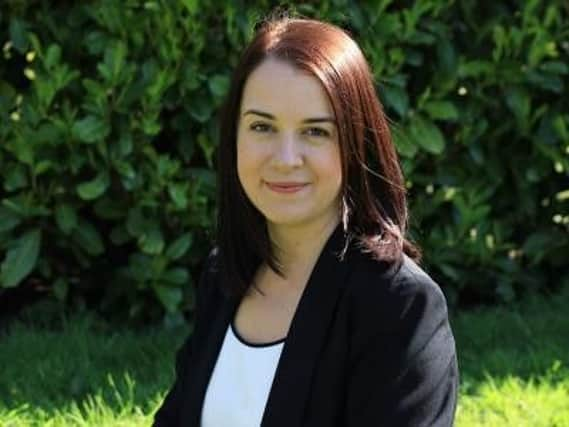Stephanie Peacock interview: 'The magic of walking into Parliament never goes away'


It was only two years ago that Stephanie Peacock suffered a disappointing election defeat in her childhood constituency of Halesowen and Rowley Regis. She had made the decision to run at the age of 26 in a bid to reclaim the seat that until recently had been held by her political mentor, Sylvia Heal.
After two years of campaigning, she lost to the incumbent Conservative MP James Morris by 3,000 votes. But that was not enough to deter her from standing again when an opportunity presented itself during this year’s snap election.
Advertisement
Hide AdAdvertisement
Hide Ad“I’ve always wanted to make a difference. And looking around and seeing what the government is doing, you’ve got a choice,” she says, when asked what it was that inspired her to run at such a young age.
“You can either sit on the sidelines, or you can get involved and try and change things. And so that motivated me to put myself forward.
“I easily could have thought ‘you know what, I’ll wait a decade, or I’ll wait and see what happens’. But I felt everyone gets their moment of opportunity in politics.”
The 2017 election presented the Labour hopeful with a completely different set of challenges, as she fought to win over an entirely new constituency in less than two months. She estimates that she and her fellow activists spoke to over 4,000 people during the campaign, taking part in door-knocking sessions twice a day to “get to know them, and get to know their concerns”.
Advertisement
Hide AdAdvertisement
Hide AdShe now regards Barnsley as “home”, and draws a number of comparisons with the region of the Black Country where she grew up. Pointing to their shared industrial heritage as an example, she claims both areas are facing “similar challenges” as they adapt to this post-industrial era.
“I’ve been reading some of the maiden speeches of my predecessors and you can chart the decline in industry in those speeches,” she explains.
“If you go back to the 60s they’re talking about 30,000 people being employed by the pits.
“Now nobody is, and the biggest private sector employers are distribution centres.”
Advertisement
Hide AdAdvertisement
Hide AdFollowing her election, she pledged to put the issue of “precarious work” and the need to attract “more and better jobs” to the area at the heart of her agenda in Westminster. A few weeks ago, she was one of 20 MPs who won the ballot to bring forward Private Members Bills, and hopes to use this opportunity to put an end to “exclusionary tribunal fees” and grant agency workers “equal treatment” to permanent employees.
Reflecting on her first few weeks in the new job, she says it has been a ”crazy” process of getting to grips with the complex rules and procedures that govern life in the House of Commons, and finding her way around the labyrinth of corridors and staircases. She admits to getting lost on several occasions, one time opening a door “totally confident I knew where I was going” only to find herself in a toilet.
She has also found herself subject to the kind of casual sexism and ageism that is sadly still all too common in Westminster, being stopped by officials and mistaken for an assistant.
But despite this – and despite having been to Westminster a number of times before – she says the “magic” of the building “never goes away”.
Advertisement
Hide AdAdvertisement
Hide AdThe former teacher claims she did not grow up in a particularly political household, but says it was her father who first persuaded her to get in touch with their local MP, Sylvia Heal, after the 2001 election sparked an interest.
She says Ms Heal was “very encouraging” in that first meeting – “I’m quite lucky that she took an interest ... she saw something in me” – and it was this that inspired her to get involved in the Labour party.
She went on to work for the MP, while also being selected to represent the party’s youth membership on the highly influential National Executive Committee. She describes the latter role – which she held for four years – as a “fascinating experience”.
She made headlines back in 2012 as a result of her relationship with the party's then-deputy chairman Tom Watson. The pair were still involved during her first run for office, but she stresses she never turned to him for political advice, preferring to do things her own way.
Advertisement
Hide AdAdvertisement
Hide AdShe caught newspapers' attention once again at the start of this year, when she was videoed doing the Gangnam Style with the former Shadow Chancellor and MP for Morley and Outwood Ed Balls.
Recollecting the encounter, she explains: "We were at a party and he'd just come off Strictly and I flippantly said 'oh, we should do the Gangnam Style'.
"I genuinely thought everyone might get involved but no, it was just me and Ed. It could have gone very wrong given the heals I was wearing."
Peacock’s predecessor in Barnsley East, the oustspoken Corbyn critic Michael Dugher, stepped down in April to become chief Executive of UK Music. She says Dugher was “very supportive” during the campaign, and reveals that one of his key pieces of advice was: “Being an MP is a unique job, and everyone does it differently.”